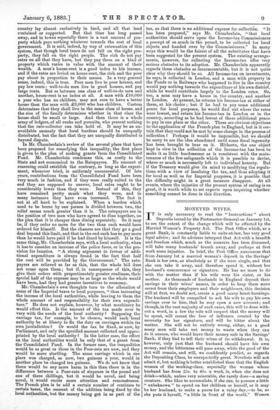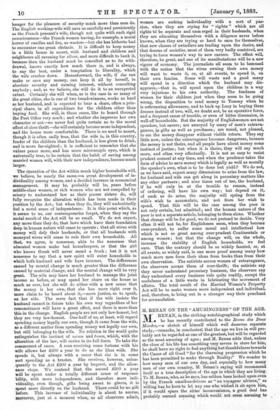MONEYED WIVES.
IT is only necessary to read the " Instructions " about Deposits issued by the Postmaster-General on January 1st, to see the extent of the change which will be effected by the Married Women's Property Act. The Post Office which, as a great Bank, is constantly liable to suits-at-law, has very good legal advice; and its advisers interpret that Act with a breadth and freedom which, much as the measure has been discussed, will take many husbands' breath away, and perhaps at first work some injustice. In brief, the Post Office announces that from January 1st a married woman's deposit in the Savings' Bank is her own, as absolutely as if she were single, and that she can take it away, and therefore spend it, without her husband's concurrence or signature. He has no more to do with the matter than if his wife were his sister, or his mother. As thousands of husbands in England deposit their savings in their wives' names, in order to keep them more secret from their employers and their neighbours, this decision will at first, we doubt not, create a good many heart-burnings. The husband will be compelled to ask his wife to pay his own savings over to him, that he may open a new account; and though, in the vast majority of such cases, this will be done with- out a word, in a few the wife will suspect that the money will be spent, will resent the loss of influence created by the necessity for her signature, and will be bitter about the matter. She will not be entirely wrong, either, as a good many men will take out money to waste when they can do it unseen, who would leave their money safe in the Savings' Bank, if they had to tell their wives of its withdrawal. It is, however, only just that the husband should have his own money, and the bitterness will pass away, while the good of the Act will remain, and will, we confidently predict, as regards the Depositing Class, be unexpectedly great. Novelists will not admit it, but nothing is better established than that the English woman of the working-class, especially the woman whose husband has from 25s. to 40s. a week, is, when she does not drink—which, unless very miserable, she rarely does—a saving creature. She likes to accumulate, if she can, to possess a little " unbeknown " to spend on her children or herself, or it may be her husband, to make a purse for a rainy day,—to be, as she puts it herself, "a little in front of the world." Women
hunger for the pleasure of security much more than men do. The English working-wife will save as carefully and persistently as the French peasant's wife, though not quite with such rigid penuriousness—the French women having, for example, a moral horror of candles and fire, as wasters—but she has hitherto had to encounter one great obstacle. It is difficult to keep money in a little house in secret, with husband and children and neighbours all ravening for silver, and more difficult to bank it, because then the husband must be consulted as to its with- drawal, knows exactly how much there is, and is always, to say the best, under a temptation to liberality, which the wife crushes down. Henceforward, the wife, if she can make or save any money, can keep it all by herself, in absolute security and earning interest, without consulting anybody ; and, as we believe, she will do it to an unexpected extent. Certainly she will when, as is the case in so many of the great cities, she is one of two bread-winners, works as hard as her husband, and is expected to bear a share, often a prin- cipal share, in all expenditure for the children other than buying food. She will, in those cases, like to hoard through the Post Office very much ; and whether she improves her own character or not—we never feel quite certain as. to the moral effect of close thrift—she will certainly become more independent, and the house more comfortable. There is no need to assert, though it is often sadly true, that the wife is, in this country, fonder of the children than the husband, is less given to drink,. and is more far-sighted ; it is sufficient to remember that she values pence more, and has more microscopic eyes, which is universally true, to be certain that the habit of saving among married women will, with their new independence, become much larger.
The operation of the Act within much higher households will, we believe, be nearly the same,—a great development of in- dividuality among women, and a decided increase in economical management. It may be, probably will be, years before middle-class women, or rich women who are not compelled by misery to understand law as their poorer sisters do, will fully recognise the alteration which has been made in their position by the Act; but when they do, they will undoubtedly feel a novel sense of independence. It is this point which, as it seems to us, our contemporaries forget, when they say the social result of the Act will be so small. We do not expect, any more than they do, that laws which have their foundation deep in human nature will cease to operate ; that all wives with money will defy their husbands, or that all husbands with moneyed wives will cease to rule their own households. All that, we agree, is nonsense, akin to the nonsense that educated women make bad housekeepers, or that the girl who knows Greek will never mend a frock ; but it is not nonsense to say that a new spirit will enter households in which both husband and wife have incomes. The differences mused by mental change is much greater than the difference caused by material change, and the mental change will be very great. The wife m4 leave her husband to manage the joint income as before, or may spend her share on the house as much as ever, but she will do either with a new sense that the money is her own, that she has more right over it, more claim to be heard about it,—more justice, so to speak, OR her side. The mere fact that if the wife insists the husband cannot in future take his own way regardless of her remonstrance will have a great effect, and there is more than this in the change. English people are not only law-honest, but they are very law-honest. One-half of us, at least, will regard spending money legally our own, though it came from the wife, as a different matter from spending money not legally our own, but still belonging to the wife. No relation in the world quite extinguishes the instinct of meum and tuum, which, with the alteration of the law, will revive in its full force. To take the commonest of cases. A man receiving some fortune with his wife allows her £200 a year to do as she likes with. She spends it, but always with a sense that she is in some sort spending as a trustee. She receives, however, subse- _quently to the Act £200 a year by bequest, and the allow- ance stops. We contend that the second 2200 a year will be spent under a totally different sense of responsi- bility, with more independence, and therefore more indi- viduality, even though, gifts being sweet to givers, it is spent more directly on the husband. There could be no gift before. This increase of individuality is about• to accrue, Moreover, just at a moment when, as all observers admit,
women are seeking individuality with a sort of pas- sion, when they are crying for " rights " which are all
rights to be separate and nnm erged in their husbands, when they are educating themselves with a diligence never before known, when they are trying so hard to earn for themselves, that new classes of swindlers are trading upon the desire, and that dozens -of societies, 'most of them very badly contrived, are trying to force women's way to new careers. The effect will, therefore, be great, and one of its manifestations will be a new vigour of economy. The journalists all seem to be bemused with the notion that the wives owning their own money will want to waste it, or, at all events, to spend it, on their own fancies. Some will waste and a good many will spend in a direction which the husband may dis- approve,—that is, will spend upon the children in a way very injurious to his own authority. The fondness of wbmen for their children just when they seem to be going wrong, the disposition to send money to Tommy when he is outrunning allowances, and to back up Lucy in buying three dresses instead of two, will, we doubt not, be an operative force, and a frequent cause of trouble, or even of bitter dissension, in well-off households. But the majority of Englishwomen are not spenders, but savers; are annoyed by many of men's extrava- gances, in gifts as well as purchases ; are vexed, not pleased, to see the money disappear without visible return. They say little now, unless the extravagance becomes dangerous, because the money is not theirs, and all people have about money some instinct of justice; but when it is theirs, they will say much more, and often very effectually. It is not so easy to resist prudent counsel at any time, and when the prudence takes the form of advice to save money which is legally as well as morally the speaker's own, what is to be done but yield P We do not, as we have said, expect many dissensions to arise from the law, for husband and wife can get along in pecuniary matters like any other partners ; and nine times out of ten, the husband, if he will only be at the trouble to reason, instead of ordering, will have his own way; but depend on it, of such as do arise, the majority will spring from the wife's wish to accumulate, and not from her wish to spend. That this will be the case among the poor is not only certain, but admitted; and the human nature of the poor is not a separate article, belonging to them alone. Whether that change will be for good, we do not pretend to decide. Very often it will not be, for Englishmen seem, when they become over-prudent, to suffer some moral and intellectual loss which is not so great among over-prudent Continentals or among women ; but that the change will, on the whole, increase the stability of English households, we feel sure. That the contrary should be so widely fancied, or, at all events, so widely said, is one more proof among many how much more men form their ideas from books than from their own observation. The satirists accuse women of extravagance, the observers accuse them of over-thrift; the satirists say they never understand pecuniary business, the observers say they understand every business rule quite readily, except the usefulness of a little waste in lubricating the movement of affairs. The total result of the Married Women's Property Act will be to make women more independent and individual, and, therefore, to bring out in a stronger way their penchant for accumulation.















































 Previous page
Previous page